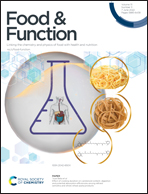Anti-tumor activity of polysaccharides extracted from Pinus massoniana pollen in colorectal cancer- in vitro and in vivo studies
Abstract
The prevalence and mortality rate of colorectal cancer (CRC) have been increasing dramatically worldwide. Pinus massoniana pollen, a well-known natural food, is one of the most commonly consumed traditional medicines in China. P. massoniana pollen polysaccharides (PPPS) have antitumor effects, but it remains unclear whether they can inhibit CRC. Here, we have demonstrated that PPPS inhibited CRC cell proliferation effectively, induced morphology changes, triggered apoptosis by upregulating key apoptosis-related proteins, and arrested the cell cycle at the G0/G1 phase. Moreover, PPPS markedly inhibited CRC cell metastasis by downregulating MMP-9 and inhibiting epithelial–mesenchymal transition. In vivo, PPPS exhibited potent antitumor activity and no observable toxicity in BALB/c nude mice bearing HCT-116 tumors. Most strikingly, PPPS pre-treatment dramatically inhibited the growth of incipient tumors, although not as effectively as in the PPPS-Ther group. Thus, our results suggest that PPPS can be a potential anti-CRC agent, paving the way for developing complex carbohydrates for tumor prevention and treatment.



 Please wait while we load your content...
Please wait while we load your content...